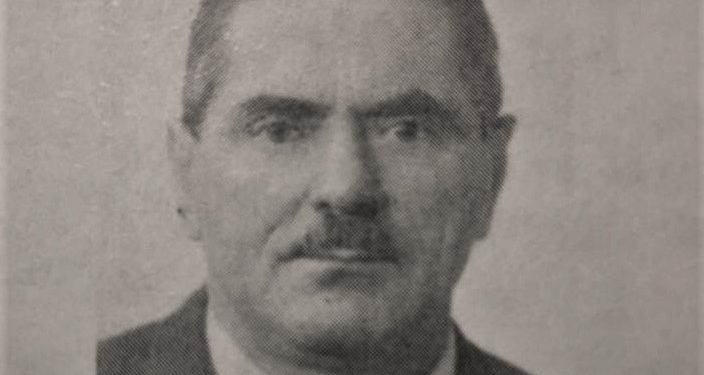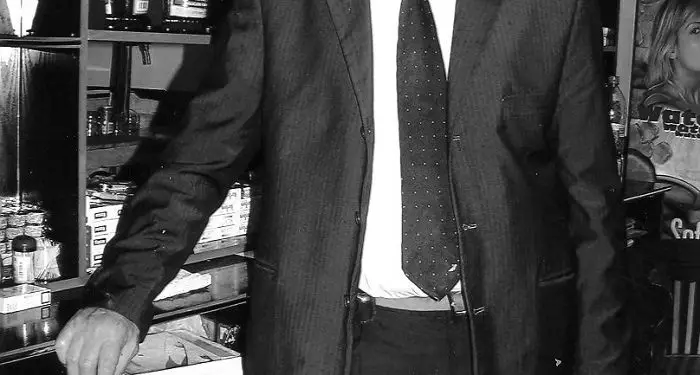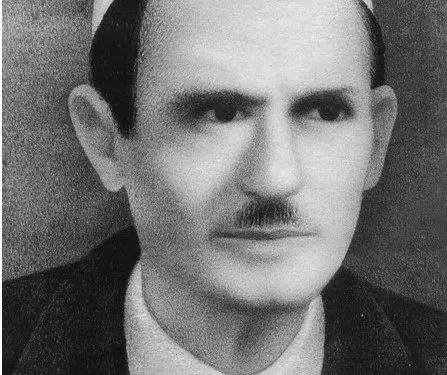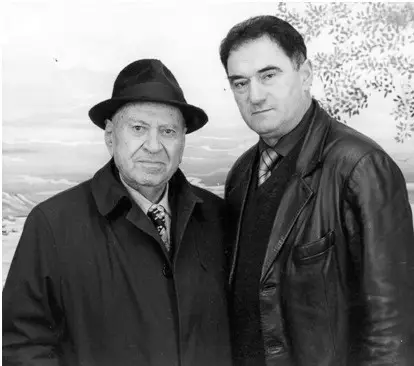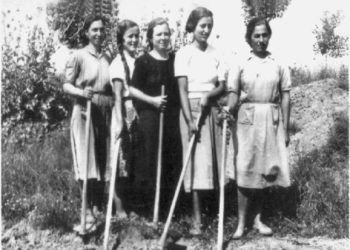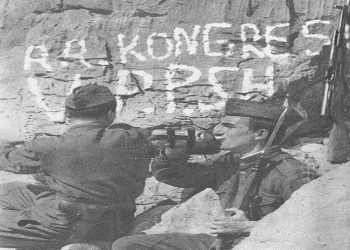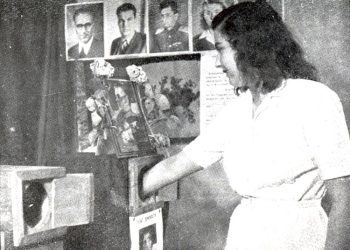From Ndue Dedaj
– “We have been home for five hundred years, since the time of Skanderbeg, the elders told us.” –
Second part
Memorie.al / Often in the life of the people you come across facts that make you think deeply, as in the case where a mountain door, a well-known house, like that of the Qafajs of Fushë-Arres, originally from Spaçi of Mirdita, had the flag its own, just like the Albanian dynasties of the Middle Ages, the Kastriots and Dukagjins, who had coats of arms, emblems, seals, as it was believed that they also had their own guardian “hyll”. In those times, it had its own flag and province, and the flag, but also the big house, the first house, which was like a separate state. The truth is that if somewhere in the plains and cities some authentic values fell, due to the frenzy of foreign invasions, in the mountains they were preserved as survival, as life or ceremonial practices, as rituals. It is possible that the flag of the Pirusts had the appearance of an Illyrian helmet, or a copper or bronze emblem. The flag of the Principality of Arbër and that of the Dukagjins later had the same heraldry, the single-headed eagle. Mirdita’s flag was the national one, the double-headed eagle, but with the element marking the sun with rays, where the five-pointed star was later placed. The flag of Kuzhnen’s Land (bajrak) consisted of an open white hand on a red field, with a red cross on a white field, as described by Franc Nopça. It is known that in Mirdita the bride’s veil was with an eagle. The Albanian aristocracy of the mountains, which had as its basic feature the chief, could remain intact in its autochthonous essence, without being bent and alienated by the cultures of the conquests, with all its hospitable, assembly signs.
Continues from last issue
The original flag of the Qafaj: a green oak branch, on a white field the echo of the ancestors, the leaders of the mountains
An autochthonous highland, in Mirdita or Labëri, cannot be understood without the wars, endurance, bravery, the figures with its voice, the folklore that has accompanied it. The famous rhapsody Prendush Gega wrote about the figures of this northern highland, just like Fishta about the leaders of the Great Highland. In a folk song collected in Lumë and published in “Visaret e Kombit” in 1939, it echoes especially the warrior of the day, Ndrecë Ndue Qafa from Fushë-Arrësi.
The mountaineer has always liked to be proud of his grandparents, and even brag about them, sometimes dressing them up with oral legends. He wanted to die with a song, to have his song sung, because sometimes not only the heroes but also the Cubans entered the song.
Dede Qafa is right to look for the echo of the first. But it wasn’t just men. Those who know the highlands thoroughly know the position of women, often very special. There have been women as popular as men, and it wasn’t just Shote Galica, or Nora e Hoti. An old woman from the Qafaj tribe, Dava e Tom Preni, used to deliver mail to Kosovo once a month. She put the envelopes in her thick, long socks and crossed the border with them on her “legs”, without being dictated to by the Serbian, Yugoslav militia.
The letters were from patriots, such as Bajram Curri and others, whom Dava took to Prizren, Gjakova, etc. If it was dictated that she carried out that patriotic activity, Dava e Qafajve herself and her family would be severely punished. It was a popular post, without state stamps and stamps. For many years, the post office in our mountains has functioned like this.
The people heard in these parts went from mouth to mouth, being mentioned for their bravery and wisdom and this until late times. While you are in Fushë-Arrës e Pukë, you hear a lot of names such as: Ndrecë Ndue Qafa, Bajram Aga, Myftar Mustafa, Nikollë Curri, Pashk Curri, Mark Dod Alia, Plaku i Qafa e Mali, Zenel Islami, Ali Hasan Furriku, Qamil Morina, Zef Dede Cara, Zef Prendi, Halil Kopani, Elez Selimi, Kol Mehilli, Arif Halili, Ndoc Ukshini, Rexhep Uka, etc.
Meanwhile, apart from Migjeni, the legendary writer, they have left their mark in time, but have also taken with them the Pukyan cultural benefit, creators such as: Filip Ndocaj, Mat Doda, Ndue Shyti, Frrok Haxhia, Vito Koçi, Mariana Leka, Françesk Radi, Roland Gjoza, Prend Ukaj, Davë Gjergji, Vitore Rusha, Zoë Pali, Fran Vukaj, Gjon Curri, Sabah Sinani, Ndreke Mustafa, Ndreke Gjini; researchers such as Jaho Brahaj, Sabrie Nushi, Xhemal Meçi, Josif Papagjoni, Mark Mesuli, Ismet Balaj, Ndue Çuni, Gjovalin Alia, etc., young writers Mirela Sula, Petrit Nika, Tone Prendi, journalist Armir Mehaj, etc.
The television icon, Tefta Radi, in an interview remembers going to Puka for the first time, in 1976, “a place that left a great impression on me, the beauty, the nature, the blue-green waters, the forested mountains, unprecedented greenery, but also a scary road with heights and slopes”. No one has escaped the unusual natural greenness of the trees, from which stone and water and man himself had taken.
The fugitive in America Pjeter Çup Qafa, dressed as a woman, to escape the pursuit!
“…We here in Albania have been following Pjetri every step of the way, for dozens of years, after he became well known abroad as an anti-communist. They didn’t let us breathe. It wasn’t about school for us. In 1949, Pjetri did this to escape, took his daughter, Liza, who was at school and told the mayor of Fushë-Arres, Ali Hasan Furriku, that he wanted to visit her at the doctors, that the girl was sick.
With that “sebep”, he took his wife and daughter and headed to the mountains of Puka, where in Va Dardhë, about forty people who were fleeing crossed the Drin, with rresheka (goat skin inflated as a chambermaid), and threw themselves into Yugoslavia where they put them in prison.
Pjetri first stayed in a village near Gjakova, Kosmet, Podujevë, etc. Kujtimi and his two brothers, Nikolla and Simoni, were born there. He entered and exited here several times, as has been said, dressed as a woman, he passed through Fushë-Arres and was not recognized (!), Pjetri came from Yugoslavia and took Mark Gjok Cara, the mayor of the locality of Fushë- Arres, in the early 50s, while his wife stayed here, as she was pregnant and could not escape in that condition.
Therefore, Peter was forced to come again, after a while, now to take Mark’s wife, with several others. Of course, the state knew that he would come, so they surrounded Qafaj’s house with 200 members of the Pursuit Force, but he was already much trained in these jobs, which looked like dangerous adventures, like those seen in movies. He managed to take Mark Cara’s wife, along with two men from this side who would also escape, where they all cross the border together. “Peter Qafa lived in Detroit until recently, when he passed away.”
But recent history has completely changed course. Fran Qafa is a lecturer at the Faculty of Law at the University of Shkodra. His eldest son, Mikeli, studies at New York University in the USA. In 2008, in an international competition in Tirana, he won the scholarship to study in Mostar, in one of the colleges of the United World. Announced among the 6 best students in the country among 92 competitors. This was a new standard of the people of this house. Now in America, they no longer come as political refugees, but as people of a free democratic society, which creates the greatest opportunities for education.
The political attack on the Qafajs started with the “saboteur group” of the Sharas!
In the second half of the 20th century, Fushë-Arrësi became synonymous with sawmills (wood processing) and copper mines, the center of a workshop that is still alive today. This development brought a different way of life for the inhabitants of the highlands, the cities that were created, men and then women being integrated into different jobs and professions. The mines of Munella, Laku i Roshi, Tuci and Qafa i Bari, two of which have been put back into operation and two of which are waiting for investors to reopen, are the wealth of the people who once slept on the rocks.
But there was also the other side of the coin, the class war, which had entangled these ridges that had been eternally free, climbing a political prison up to the mountains of the Bari Pass, as the Russian dissidents used to devastate them in Siberia, in the middle of winter merciless of the steppes. The communist persecution of the Qafajs, with 10 politically convicted men, as well as others who escaped and was persecuted by this family, proves that the communist regime never lowered the Sword of Damocles from its hand.
They were: Preng Pjetër Qafa, Pal Preng Qafa, Dodë Ndrec Qafa, Nikoll Ndue Qafa, Ndue Zef Qafa, Mark Preng Qafa, Viktor Ndue Qafa, Gjokë Dodë Qafa, Pashk Dodë Qafa, Frrok Ndrec Qafa. One of the ten, Pal Qafa, martyred, is buried somewhere in the mountains of Tërbun, until the dawn of democracy.
Taking ten decorations from a regime is too much, not ten pairs of handcuffs of the dictatorship of the proletariat on a noble door. The attack on the Qafajs had already begun with the process of “sabotage at the sawmills” in 1949 when a “hostile” group headed by the master Rrok Mazreku from Shkodra, the brother of the priest of Kryeziu, Dom Nikollë Mazreku, a well-known writer and researcher, was arrested.
That political process had some shot as saboteurs and peace agents of Tito’s UDB, such as Rrok Mazreku, Sotir Rusta, Tomi Llasi and sentenced to political imprisonment: Zeqir Selimi and Gjok Qafa. On that occasion, they also put Ndue Zef Qafa in prison, with the absurd accusation that he “wanted to blow up the Fushë-Arres sawmill”, which was not true.
They kept him under investigation for 8 months in Shkodra prison, in severe conditions, and were forced to release him without a trial due to lack of evidence. They were not the ones who wanted to blow up the sawmills of Puka, but the regime that had blown up democracy through the dictatorship of the proletariat!
Dede Qafa was also called to the State Security offices, as a “spy for the Americans”. If I mention the name of America, I will go to prison; I will no longer be its agent. For the Bolshevik regime, the enemy could be like a miner or mountain shepherd, like a communist of 41.
In Fushë-Arres, Fadil Paçrami, playwright and leader of PPSh, who was also Minister of Education, was also interned. His wife, the former director of the National Library, had touched hell, sweeping the streets of the city with a broom. Both of them and others were now playing their drama of the ‘Dictatorship of the Proletariat’ on their backs, while the “partisan ideal” had remained far away in the shadowy silhouette of Qemal Stafa.
Qafajt, supporter of the National Liberation War and host of Kosovars since 1999
In this area of Albanian contradictions, in Fushë-Arrës and Pukë, Dede Qafa was protected, as the embodiment of humanity, as a professional in the electrical sector, then as a missionary of democracy and elected in local forums, company leader in the time of changes, businessman the god
Decorated with the high title “Grand Master”, by the President of the Republic Bamir Topi, honored and with the “Gratitude” of the Municipality of Gjakova, etc., for the treatment of 700 Kosovars with accommodation and food in his family hotel, during the genocide Serbian of 1999.
In a simple notebook, the names of hundreds of Kosovars who ate his bread in those months, bearing the surnames: Gashi, Zeka, Beqiraj, Shala, Gjonaj, Vila, Mula, Syla, Babi, Kosumi, Telaku, Gjokaj, Kabashi, Ndreca, Kastrati, Sudi, Salihi, Miraka, Pepa, Kacoli, Emini, etc. The House of Qafaj was patriotic and generous, early and late.
Deda’s father, Nikollë Ndrecë Qafa, in 1944, had hosted the 22nd Assault Brigade (partisans) with food and clothing, where its former commander, Sali Verdha, would say that: “at Nikolla’s place, he and the partisans they had seen the peak of Albanian patriotism’.
A completely original expression of Deda’s remains in mind: “my ideal has been to go to the origin”, which echoes the philosophy of every authentic Albanian family, which was deviated and deformed by the historical course through the political struggles of the 20th century Around them, they had been practitioners of private entrepreneurship and with this they had saved and strengthened themselves until the end of World War II, only to return there after half a century.
And when the expropriation and nationalization affected an entrepreneurial family in the mountains, think what had happened on this level with the great Albanian commercial families, of Shkodra, Elbasan, Vlora, etc., that would be dissolved as ownership, would be extinguished as assets and they would be alienated as a tradition.
That’s why Dede Qafa and his sivllazni really had a big dream that in 90, he returned to his origins. I heard again those chimes of Kalivara and Shmija, from where the ghost of the ancestors came as an echo of centuries.
But the written chronicle of a historical door is always incomplete, as a big house has the face of a miniature state, which has everything from a little, or from a lot! Memorie.al




